Editorial
Nova Science Publishers, New York, will publish two new books compiling many of Martin’s previous articles published in HLT and including many previously unpublished articles. See in HLT: China: Grade Inflation in Higher Education, CHINA EFL: Foreign Teacher Needed and China: Grade Inflation in Higher Education. HLT is republishing with the permission of Nova Science Publishers, New York. More articles written by Niu Qiang, PhD and Martin Wolff, J.D about English language teaching and learning in China at www.usingenglish.com/esl-in-china/
China EFL: Programming Human Robots
Niu Qiang and Martin Wolff, China
Martin Wolff, J.D. is currently a "Foreign Expert" in China teaching International Business Law, Marketing, International Negotiations, Introduction to the WTO, and Holistic English as a Foreign Language. He graduated from Loyola University, Los Angeles, with a Juris Doctor degree He was appointed a "Foreign Expert" in China in 2002 and has taught at many prestigious universities throughout China. He is the co-author, of the Holistic English Workbook series that includes: Holistic Business English; Holistic Freshman English; Holistic Marketing English; Holistic Tourism English; and eleven other specialized Holistic workbooks. E-mail: teachbesl@yahoo.co.uk
Niu Qiang, Ph.D. was born and raised in Shenyang, Lioning Province, PRC. She obtained her Bachelor of Arts degree (1991) in English from Jilin University; her Master of Arts degree (1996) in English Linguistics from Jilin University; and her PhD (1999) in English Linguistics from Shanghai International Studies University. She is currently an Associate Professor at the School of Foreign Languages, Changchun University, Jilin, China, where she teaches Psycholinguistics, Second Language Acquisition (SLA), Testing of English as a Second Language.
Menu
Introduction
Class of ’07 International Students
Spring ’08 Holistic English Freshmen II
Spring ’08 Holistic English Freshmen II
Spring ’08 Holistic English Freshmen II
Footnotes and Bibliography
Conclusion
Throughout China it begins in the middle schools, the teaching of set phrases or speech patterns. Students lacking in a general English foundation are provided texts containing set phrases or speech patterns for memorization, often without meaningful context. Their Chinese English teacher of English teaches in Chinese because the teacher lacks adequate grounding in general English and their English is so poor they are incapable of teaching in English.
Foreign experts employed in colleges are routinely asked to give English classes to middle school teachers and students. One such experience in 2003 is representative of this experience.
A foreign expert was introducing himself to individual students in a middle school class and the dialogue went like this:
FE: Hello. My name is Bob. What is your name?
Chinese English teacher: Prompts the student with something in Chinese.
Student: My Chinese name is xxx. My English name is Bill.
FE: How are you Bill?
Chinese English teacher: Prompts the student with something in Chinese.
Student: I am fine. How are you?
FE: I am fine thank you. Nice to meet you Bill.
Chinese English teacher: Prompts the student with something in Chinese.
Student: Nice to meet you too.
After this exchange occurred with six or seven students, always with the prompting of the Chinese English teacher, the foreign expert changed the dialogue ending. The following occurred:
Student: I am fine. How are you?
FE: I am really very tired and I wish I were not here teaching this class.
Student: Stares at FE with frightened “deer in headlights” look.
Chinese English teacher: Silent
Student: Turns and looks at Chinese English teacher.
Chinese English teacher: Shrugs shoulders
Student: Turns to foreign expert and shrugs shoulders
Are the middle schools merely programming robots? May it never be!
A foreign expert wrote a tongue twister on a middle school blackboard:
“How much wood could a woodchuck chuck if a woodchuck could chuck wood?”
The foreign expert asked a middle school student to stand and read what had been written on the blackboard. The student stood only after several classmates said something to him in Chinese. Instead of reading, the student remained silent and appeared to have difficulty seeing the blackboard from the back of the classroom. The foreign expert asked the student to come forward. The student did not move until some classmates said something to him in Chinese.
When the student arrived at the front of the room and stood facing the blackboard, the following dialogue occurred:
FE: Please read what I have written on the board.
Student: Please read what I have written on the board.
FE: Yes. I want you to read what I have written on the board.
Student: Yes. I want you to read what I have written on the board.
FE: Can you read?
Student: Can you read?
FE: OK. Please take your seat.
Student: OK. Please take your seat.
FE: Go and sit down.
Student: Go and sit down.
FE: I want you to go and sit down in your seat now. (Pointing to the student’s seat at the back of the room.)
Student: I want you to go and sit down in your seat now. (Pointing to the student’s seat at the back of the room.)
YES, we are merely training robots!
Middle school teachers use the ‘talk and chalk” teaching methodology and the robots err students repeat after the teacher who reads what they have written on the board. Vocabulary is taught in the same manner, with emphasis on memorization, but completely lacking in definitional meaning or contextual usability.
In Chinese colleges and universities, English is taught in 4 separate and disjointed classes, Reading, Listening, Writing and Speaking. There is no link or common subject matter between the classes. The foreign teacher is retained, primarily, to handle the oral class to force1 speech production by chatting with the students. (Yes there are exceptions but we are speaking to the overall national situation at all levels of higher education throughout China.
At the collegiate level, where 4 out of 41 teachers are capable of teaching English using English2, the ‘talk and chalk” teaching methodology is also used to teach set phrases or speech patterns.
The goal of colleges and universities throughout China is to have students pass national English competency examinations such as TEM 4, CET 4 and CET 6. Setting aside, for the moment, the fact that these national English competency examinations bear little or no relationship to comprehensible output, the pass rates have become the exclusive focus of administrative attention and false pride. Teaching set phrases and speech patterns prepares the students for these national examinations, or at least that is the theory.
A total of 120 students were admitted to a new International program designed to generate much needed income for the college by admitting academically unqualified students whose parents could afford to purchase the diploma. The students were split into 3 classes of 40 students each. Class #1 and #2 were assigned to a Chinese teacher of English who taught them set phrases and speech patters during the Fall ’07 semester while class #3 was assigned to the foreign expert who taught them Holistic English Freshmen I3.
During the spring ’08 semester, all three classes were assigned to the foreign expert who taught them Holistic English Freshmen II.
Those International classes that had not participated in the Holistic English Freshmen I program were at a distinct disadvantage. They had not had the basic instruction in proper listening skills, proper homework skills, proper writing skills, or internet research skills. They had not heard the orientation lecture and did not know of their obligation to read more English, write more English, listen to more English and speak more English outside the classroom. Plus the Freshmen II movies were too advanced in subject matter and language difficulty.
In week 9 of the spring 2008 term, the students who had participated in Holistic English Freshmen I were able to make an extemporaneous, comprehensible three-minute oral presentation.
The students who had not participated in the Holistic English Freshmen I class during the fall 2007 term were unable to produce more than ten English words when asked to make a three-minute presentation and a super majority of students could not utter a single English word other than “sorry.” Learning set phrases and speech patterns failed to prepare the students for comprehensible extemporaneous English output.
When final grades were submitted at the end of the spring ’08 semester, Class #1 had a grade point average (GPA) of 69; Class #2 had a GPA of 63.9; and class #3 had a GPA of 80.
At the end of the spring ’08 semester all three classes were asked to fill out a questionnaire to self-evaluate the various benefits they believed they had received from the Holistic English Program. The following charts reflect the students’ self-evaluation.
VOCABULARY – READING – LISTENING – WRITING – CONVERSATION
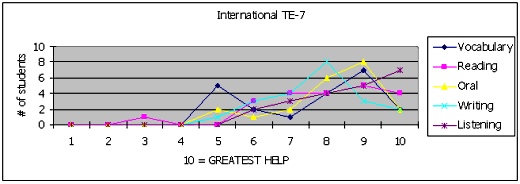
CHART #1
The International Tourism English #7 class completed Holistic English Freshmen I prior to taking Holistic English Freshmen II GPA 80.
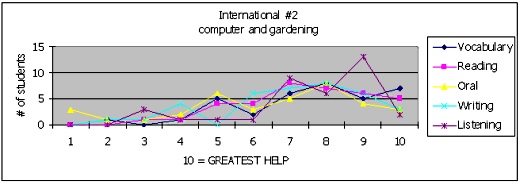
CHART #2
The International combined computer and gardening class completed a set phrase English learning class in lieu of Holistic English Freshmen I. GPA 63.9
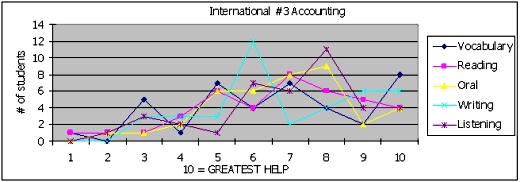
CHART #3
The International accounting class completed a set phrase English learning class in lieu of Holistic English Freshmen I. GPA 69.
CONFIDENCE – MOTIVATION – DISCIPLINE
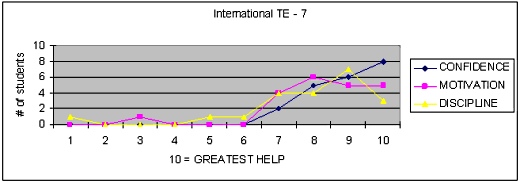
CHART #4
The International Tourism English #7 class completed Holistic English Freshmen I prior to taking Holistic English Freshmen II GPA 80.
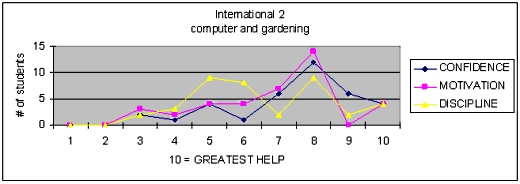
CHART #5
The International combined computer and gardening class completed a set phrase English learning class in lieu of Holistic English Freshmen I. GPA 63.9
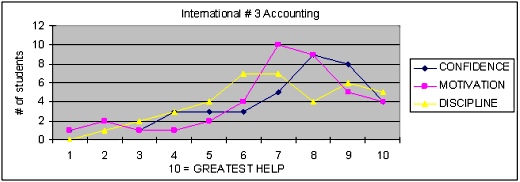
CHART #6
The International accounting class completed a set phrase English learning class in lieu of Holistic English Freshmen I. GPA 69.
WORLD VIEW - BUSINESS KNOWLEDGE
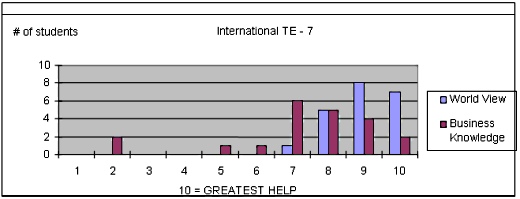
CHART #7
The International Tourism English #7 class completed Holistic English Freshmen I prior to taking Holistic English Freshmen II GPA 80.
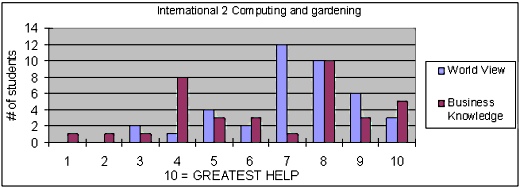
CHART #8
The International combined computer and gardening class completed a set phrase English learning class in lieu of Holistic English Freshmen I. GPA 63.9
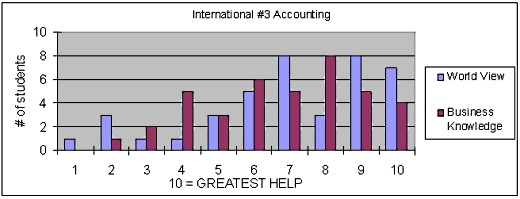
CHART #9
The International accounting class completed a set phrase English learning class in lieu of Holistic English Freshmen I. GPA 69.
Teaching set phrases does not produce speakers of comprehensible English and there are no scientific studies that prove it does. The Holistic English program requires that students begin with Freshmen I and then progress through Freshmen II, Business I and then Business II. When the Holistic English program is utilized as designed, it produces students who can produce extemporaneous, comprehensible oral English output.
It was a very ill advised move to teach set phrases or speech patterns to two of the international student groups and then throw them into Holistic English II and the administration did not consult with the Holistic English Program staff prior to making this decision. Both groups of international students who had set phrase teaching in their first freshmen semester should have failed Holistic English freshmen II and would have were it not for the grading policy that will not allow anyone to fail.
Chinese college and university administrators are starting to question the efficacy of the National English proficiency examinations.
"While my specialty is using artificial intelligence to make human-like robots, my worry as a university president is that we are turning our graduates into ‘robots'," said Wang Shuguo, President of Harbin Institute of Technology (HIT)4
While President Wang and other scholars criticize the shortcomings of a test driven educational system that begins at the pre-school level and continues on through higher education; they fail to address the more serious core issues of 1,000,000 Chinese teachers of English who cannot teach English using English because their English is so poor they resort to teaching set phrases and speech patterns from textbooks5.
1 Forced output raises the affective filter and actually prevents language acquisition. Krashen (2004) Applying the Comprehension Hypothesis: Some Suggestions
2 Qiang/Teng/Wolff (2008) (In Press) China EFL: Holistic English, Nova Science Publishers, New York
3 Qiang, Wolff, Teng, (2008) China EFL: A New Paradigm, Chapter 11, Education in China: 21st Century Issues and Challenges, Nova Science Publishers, New York
4 Beijing Review., Education Feared to Raise Robots
www.bjreview.com.cn/special/txt/2007-08/31/content_74644.htm (accessed July 10, 2008)
5 This problem is further perpetuated by Chinese educational publishers who provide the set phrase and speech pattern textbooks and little else.
We can teach a parrot to say “Polly wants a cracker.” The parrot has no idea who Polly is, does not know what a cracker is, and has no way of knowing if Polly really wants a cracker. The proud owner of this magnificent bird claims that it can talk.
Chinese college and university graduates can also talk [English] if we use the parrot standard. They can repeat set phrases or speech patterns without any understanding of their meaning or appropriate use context. They are devoid of any ability to use English creatively or to engage in effective communication. They also never learn creative thinking. President Wang’s fear, that we are creating graduates who are mere robots, is well founded.

Please check the Methodology and Language for Secondary Teachers course at Pilgrims website.


|